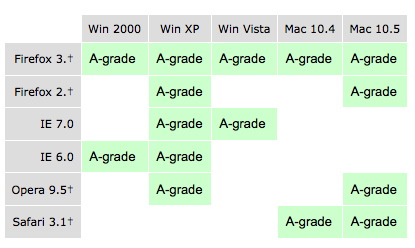UK Government standards draft needs rethinking
The UK Govenrnment's Central Office of Information has published a <a href="http://www.coi.gov.uk/documents/guidance/browser-standards-draft-v0-13.pdf">Browser Standards Draft</a> suggesting browser support should be based on usage. The draft document has misinterpreted the browser market and needs to be reconsidered.
Much to admire ¶
The Central Office of Information is the UK Goverment’s centre of excellent for marketing and communications. It is very encouraging that the department is producing a browser standards document and there is much to admire in the COI’s Browser Standards Draft. The desire to provide a consistent experience to users of Government Websites is a commendable aspiration. The document outlines how Government sites should be required to support multiple platforms and gives a good overview of the issues at stake for non-technical readers.
Much not to admire ¶
The metric chosen to define a browser standard is browser usage on a site by site basis.
Your browser standard must be based on the most popular browsers accessing your website.
Furthermore it is advised that browser standards are based on target audience demographics.
Different target audiences have different browser preferences. For example, students are more likely to use Firefox than corporate or business users. Therefore, browser standards should also take into account target audience demographics.
In my opinion this is just plain wrong and the document has failed to understand the nature of the browser market in general, and the efforts that browser vendors (including Microsoft) have been making to converge browser capabilities using Web Standards rather than diverge capabilities using proprietary technologies.
During the browser wars of the late 1990s Netscape Navigator and Internet Explorer went head to head with a series of different technologies that meant that many sites advised visitors to use one browser or the other to ensure that the site functioned correctly. This is the kind of philosophy that would support a browser standard based on usage on an individual site. Thankfully this situation no longer exists.
We have standards ¶
The W3C and the browser community in general have worked very hard to bring the browser market together so that site producers can broadly use a defined set of standards and enjoy consistent display in any browser. There are quirks in browsers but the key message is that we have gone beyond the issues of the late 1990s to arrive a situation where standards based websites do not need to worry about whether or not a users experience is consistent.
Here’s where I feel the draft document is wrong:
However, there are a large number of different browsers on the market and to support all of them would be impractical and inefficient.
This statement is taken to mean that as there are so many divergent browsers we should create a standard based on the browsers that are used on a single site. But the internet is not just single sites. It is a large cohesive network of sites that live and breathe together. We have a set of standards that make creating websites practical and efficient and we have a set of browsers that largely support and interpret these standards correctly. So my point is that we should focus on producing Browser Standards based on convergence and not divergence to reflect the status of the browser market.
We have a standard of sorts ¶
The work that this document is attempting to do has already been done by one of the largest players on the Internet - Yahoo!. Yahoo’s Graded Browser Support has become a defacto standard on the web. It bases browser support on capability and not on usage. I won’t duplicate the explination here - there are details on the Yahoo’s Graded Browser Support page.
In the GBS We have an excellent framework we can use that covers the overwhelming majority of the browser market based on browser capability.

Conclusion ¶
My opinion is that the COI has got this draft very wrong and that it needs to be rewritten to base browser support on capability and not usage. Failing to do so would be a serious misunderstanding of the efforts that the browser market has been making to make it easier for site producers to produce consistent, multi-platform websites.
I seriously hope the COI will reconsider this position. There are many others who agree with me. You can add your weight to the argument by reading and responding to the consultation before October 17th.
Tags
Can you help make this article better? You can edit it here and send me a pull request.
See Also
-
Google Chrome - no pulse racing but it is fast
Last week Google launched a new web browser Google Chrome. Built to facilitate the next generation of web applications the browser is an exciting newcomer to the market that wins on performance and features but looks like 'my first web browser'. -
IE6 not going anywhere soon
I've been monitoring browser statistics on clients over the last few months in order to understand the effects of the IE7 forced update by Microsoft. Among corporate clients it doesn't seem to have had much effect and IE6 looks set to be around for a while. -
Microsoft and IE8 default behaviour
Microsoft has changed its mind about the proposal to use a meta tag to trigger IE8 to use the standards rendering mode.